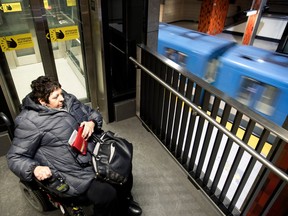“There’s a lot of things that seem good, but how will that be put in place? We’re not sure,” said Martin Lalonde of Ex Aequo, a group promoting the rights of people with motor disabilities.

Montreal’s new accessibility plan is drawing criticism from some of the very stakeholders it was meant to support, who call it vague and lacking practical solutions to systemic barriers.
The plan was unveiled on Tuesday by Mayor Valérie Plante to mark the International Day of Persons With Disabilities, and aims to make Montreal a universally accessible city.
“We are taking an important step towards our goal of making Montreal a city that integrates universal accessibility into all stages of its decisions,” Plante said in a statement.
Josefina Blanco, city councillor for Rosemont—La Petite-Patrie, added: “By presenting this plan, we are reiterating that the City of Montreal is making the development of universal accessibility a priority.”
However, some stakeholders argue that the plan lacks clear implementation strategies.
“I think there’s a lack of real systemic measures that will bring systemic change.”
Gauthier, who received the Order of Montreal for her work advocating for inclusivity, said accessibility in Montreal has barely improved since the early 2000s.
How bad is accessibility in Montreal?
More than half of Montreal’s stores lack adequate accessibility, according to Gauthier. Obstacles range from poorly designed entrances to insufficient signage and staff training. Lalonde believes the actual figure may be even higher.
This persists despite about 11 per cent of Quebec’s population experiencing moderate to severe disabilities, according to provincial data.
The mayor’s plan assessed the city’s accessibility as being at Level 2 out of 5. Level 1, labelled “invisible,” indicates no awareness of accessibility issues, while Level 2 is defined as “taking awareness.” By 2030, the goal is to reach Level 4, which is dubbed “strategic accessibility.”
The plan outlines broad goals, such as improving knowledge of accessibility barriers and raising awareness among city partners, along with annual monitoring. A whole swath of example actions include conducting surveys, creating a tool to manage accessibility complaints, and piloting Bixi bikes adapted for people in wheelchairs.
Béatrice Saulnier-Yelle, a spokesperson for Plante, told The Gazette: “A significant amount of catching-up work is underway to improve the city’s universal accessibility, and we are determined to accelerate this transformation.
“With this plan, we have given ourselves the means to improve our practices through concrete, clear, ambitious and achievable objectives. Indicators and targets are also being developed so that we can clearly measure our progress.”
She added that the city recently improved the Business Accessibility Assistance Program, offering up to $40,000 to merchants to adapt their businesses. Critics, however, remain unconvinced.
“In the document, it lists examples of action, so we don’t have a global view of what will actually be put in place,” Lalonde said. “We have participated for years, and we are still waiting for real action.”
Gauthier echoed those concerns, saying her organization initially participated in the city’s consultations but eventually gave up.
“We did participate at the beginning, until right after the pandemic,” she said. “And every time that we were there, we had the feeling that we were losing our time.”
Gauthier’s organization focuses on helping people file complaints against businesses that fail to provide adequate accessibility. However, she said, the city often avoids addressing these issues.
Recently, Gauthier discovered that residents can also file complaints against the city itself. The process, however, comes with strict conditions, including filing the complaint within six months.
“Maybe it won’t be solved at the first complaint we file like that, but at one point, maybe they will understand,” she said.